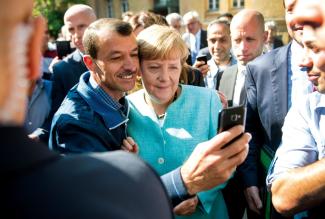International relations
A call for global engagement

Starting in the new year, Germany will be a member of the UN Security Council for the sixth time, allowing it to actively influence world politics at the highest level. The vote took place in June. Germany immediately won an overwhelming majority in the first round: it received 184 out of 190 votes in the General Assembly for one of the ten seats reserved for non-permanent members.
The vote can be taken as a sign of confidence. And it echoes the results of a study done by GIZ on how Germany is perceived abroad. The study shows that Germany has become a respected and appreciated member of the global community. Nevertheless, in the eyes of the world, the country would do well to act more decisively on the international stage.
In 2017, for the third time in six years, GIZ asked 150 experts on Germany from every continent about their views of the country. It compiled around 4,200 qualitative statements and responses that provide an impression of how Germany is perceived abroad. One major finding was the clear wish on the part of respondents for greater German engagement – more and more strongly expressed from study to study. The consensus was that Germany is needed now more than ever as a guardian of western values, a proponent of international cooperation and a well-meaning advocate of active multilateralism.
Filling the vacuum
Many people want Germany to act as a counterweight to the US, Russia and China, which are now, each in their own way, harkening back to narrow definitions of national interests and occasionally exhibiting Cold War reflexes. A rise in populism and threats to free trade, combined with the reshaping of international power-sharing and burden-sharing arrangements, further increase the need for Germany to take on a stronger role. Survey participants said that a political
vacuum has emerged internationally, not least due to the actions of US President Donald Trump. They only trusted a few states to stand up to him, including Germany.
Changes in the international scenario have resulted in more and higher expectations of the middle power at the heart of Europe. The expectations relate to issues ranging from peace and security to development cooperation and climate protection.
However, people do not want Germany to take on an isolated leadership role, but rather a collaborative one within the EU context. Germany can and may pursue its legitimate interests, but it should express them clearly and consider that this is best done by striving for the greater good. Germany should act as a “soft power” with international influence, able to actively promote peaceful coexistence and cooperate with others on rising to our era’s great challenges.
A typical statement from Brazil reads: “When I think of Germany, I see its important and stabilising role within the EU and regard it as a major counterweight to the USA under Trump.” In India, a respondent observed: “From a historical perspective, it is inevitable that Germany will take on a leading international role in the future.” And a Canadian stated that “Germany has the opportunity to ... enhance international cooperation on security, the environment, climate change and free trade.”
In order for Germany to muster the courage to take a more active role in global policy, it must “emerge from the shadow of the past”, respondents frequently recommended. Germany’s history is a fact and must never be forgotten, but instead of continuing to be a limiting factor, it should become a motivating one. Precisely the way it addressed its totalitarian history was what makes Germany a credible champion of international cooperation in the eyes of the world.
A culture of welcome
One issue that has deeply divided public opinion in Germany seems to have inspired particular faith in the country internationally: the acceptance of refugees starting in September 2015. The situation might have caused domestic turmoil, to put it mildly, but to the outside world, the culture of welcome did not harm Germany’s reputation. On the opposite: it inspired new respect for – and trust in – the country.
That does not mean that related difficulties are being overlooked. People in other countries are certainly aware of the problems, and they believe that Germans’ general outlook should become yet more open and international. In any case, the treatment of refugees has softened Germans’ image as a capable, efficient and sometimes hardened people and added a new characteristic of a global humanitarian citizen.
Participants in the study want to see Germany exhibit more of that attitude in every arena, from the global energy transformation to respect for human rights, and in every body, including the UN Security Council.
The expectations are high. And they are remarkably uniform: according to the GIZ study, the era of German restraint is over. What is in demand now more than ever is visionary and active international cooperation.
Link
GIZ, 2018: Germany in the eyes of the world.
https://www.giz.de/en/downloads/180509_giz_d-studie3_EN_rz_02_web_rgb.pdf
Sabine Tonscheidt has been the director of corporate communications at GIZ since November 2015.
https://www.giz.de










